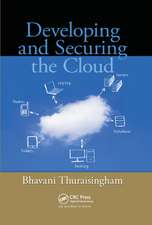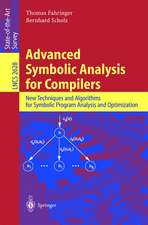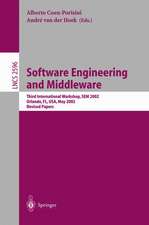Human–Computer Interaction: Fundamentals and Practice
Autor Gerard Jounghyun Kimen Limba Engleză Hardback – 20 mar 2015
Filling this need, Human-Computer Interaction: Fundamentals and Practice supplies an accessible introduction to the entire cycle of HCI design and implementation—explaining the core HCI concepts behind each step. Designed around the overall development cycle for an interactive software product, it starts off by covering the fundamentals behind HCI.
The text then quickly goes into the application of this knowledge. It covers the forming of HCI requirements, modeling the interaction process, designing the interface, implementing the resulting design, and evaluating the implemented product.
Although this textbook is suitable for undergraduate students of computer science and information technology, it is accessible enough to be understood by those with minimal programming knowledge. Supplying readers with a firm foundation in the main HCI principles, the book provides a working knowledge of HCI-oriented software development.
The core content of this book is based on the introductory HCI course (advanced junior or senior-level undergraduate) that the author has been teaching at Korea University for the past eight years. The book includes access to PowerPoint lecture slides as well as source code for the example applications used throughout the text.
| Toate formatele și edițiile | Preț | Express |
|---|---|---|
| Paperback (1) | 246.05 lei 6-8 săpt. | |
| CRC Press – 30 sep 2020 | 246.05 lei 6-8 săpt. | |
| Hardback (1) | 715.79 lei 6-8 săpt. | |
| CRC Press – 20 mar 2015 | 715.79 lei 6-8 săpt. |
Preț: 715.79 lei
Preț vechi: 894.74 lei
-20% Nou
Puncte Express: 1074
Preț estimativ în valută:
137.03€ • 142.44$ • 113.61£
137.03€ • 142.44$ • 113.61£
Carte tipărită la comandă
Livrare economică 05-19 februarie 25
Preluare comenzi: 021 569.72.76
Specificații
ISBN-13: 9781482233896
ISBN-10: 1482233894
Pagini: 184
Ilustrații: 129 black & white illustrations, 18 black & white tables
Dimensiuni: 156 x 234 x 15 mm
Greutate: 0.41 kg
Ediția:1
Editura: CRC Press
Colecția Auerbach Publications
Locul publicării:Boca Raton, United States
ISBN-10: 1482233894
Pagini: 184
Ilustrații: 129 black & white illustrations, 18 black & white tables
Dimensiuni: 156 x 234 x 15 mm
Greutate: 0.41 kg
Ediția:1
Editura: CRC Press
Colecția Auerbach Publications
Locul publicării:Boca Raton, United States
Cuprins
Introduction. Specific HCI Guidelines. Human Factors as HCI Theories. HCI Design. User Interface Layer. UI Development Toolkit. Interactive System Development Framework. User Interface Evaluation. Future of HCI.
Descriere
This textbook goes through the complete cycle of HCI design and implementation, explaining the core HCI concepts behind each step. Illustrating the entire development cycle of an interactive software product, it starts by reviewing the fundamentals of HCI. Next, it delves into the application of this knowledge. It covers the forming of HCI requirements, modeling the interaction process, designing the interface, implementing the resulting design, and evaluating the implemented product. The book includes lecture slides and source code for the example applications.
Notă biografică
Gerard "Gerry" Jounghyun Kim earned his bachelor’s in electrical and computer engineering at Carnegie Mellon University and his master’s and PhD at the University of Southern California. He started his academic career at POSTECH in 1996 after a short post at the U.S. National Institute of Standards and Technology as a National Research Council postdoctoral fellow. In 2006, he moved to Korea University. Since 1996, he has been conducting research in the HCI area, including virtual and mixed reality, mobile interaction, and multimodal interaction. Dr. Kim has written more than 100 articles in international and domestic journals and conferences, and he has also published a book (Designing Virtual Reality Systems, Springer, 2005).


























